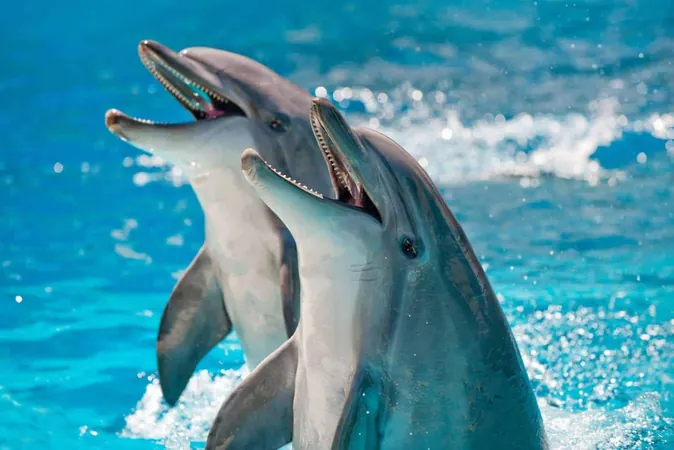
Dolphins and Orcas: The Unstoppable Evolutionary Journey from Land to Sea
2025-01-20
Author: Chun
A groundbreaking study published in July 2023 in the journal *Proceedings of the Royal Society B* reveals that dolphins and orcas have reached an evolutionary "point of no return." These marine mammals, which once had terrestrial ancestors, have adapted to such an extent to ocean existence that returning to land is no longer an option. This revelation opens up significant discussions surrounding permanent evolutionary changes and their consequences for biodiversity.
From the Shore to the Deep: The Evolutionary Shift
The narrative of life on Earth is one marked by dramatic transitions between aquatic and terrestrial environments. About 375 million years ago, the earliest fish transitioned from water to land, paving the way for tetrapods – the forebears of all land-dwelling vertebrates. However, approximately 250 million years ago, some of these mammals made a remarkable decision to re-enter the ocean, leading to the eventual emergence of whales, dolphins, and orcas.
These highly adaptable creatures underwent a series of vital changes that empowered them to thrive in marine settings. They evolved larger body sizes to maintain heat in colder waters and adapted a carnivorous diet to nourish their energetic lifestyles. Anatomical modifications like streamlined bodies and specialized fins further refined their swimming skills, marking them as exceptional ocean inhabitants.
Why Can’t They Reverse Course?
Bruna Farina, a Ph.D. student from the University of Fribourg in Switzerland, undertook an extensive examination of this evolutionary conundrum. Analyzing over 5,600 mammal species, she categorized them into four distinct groups based on their land-water adaptability.
Her research unveiled a pivotal tipping point between semi-aquatic and fully aquatic species. Once this threshold is surpassed, the adaptations become fixed, aligning with Dollo’s law – a theory positing that evolution does not revert to ancestral traits. This interesting twist suggests that dolphins and orcas are now forever bound to their aquatic lifestyles, unable to revert to their terrestrial origins.
Implications for Marine Life and Ecosystems
The findings have profound implications for our understanding of evolution and the status of marine biodiversity. Dolphins and orcas now find themselves "trapped" in their specialized adaptations, perfectly suited for life in the ocean but rendering them incapable of surviving on land.
This predicament is further exacerbated by contemporary challenges such as climate change and ocean pollution. As these issues intensify, the already precarious existence of these species raises urgent questions about their adaptability and survival linked to the well-being of marine ecosystems.
The Future of Evolutionary Research
Though this study solely focused on mammals, it opens avenues for future research that could explore similar evolutionary patterns in other tetrapod groups, such as reptiles and amphibians. Virag Sharma, a researcher at the University of Limerick, posed intriguing questions about whether analogous adaptations exist across various species.
As we contemplate these discoveries, it’s crucial to grasp that evolution is not a linear process. Instead, it presents myriad twists and turns filled with irreversible adaptations. This prompts vital inquiries about how these permanent changes affect resilience against environmental alterations and whether other species face similar evolutionary dead ends.
Understanding the evolutionary journey of marine mammals gives us valuable insights into our planet's past and the challenges that lie ahead. As we navigate these findings, it's imperative to reflect on the balance between adaptation and conservation efforts essential to safeguarding the future of these extraordinary species.


 Brasil (PT)
Brasil (PT)
 Canada (EN)
Canada (EN)
 Chile (ES)
Chile (ES)
 Česko (CS)
Česko (CS)
 대한민국 (KO)
대한민국 (KO)
 España (ES)
España (ES)
 France (FR)
France (FR)
 Hong Kong (EN)
Hong Kong (EN)
 Italia (IT)
Italia (IT)
 日本 (JA)
日本 (JA)
 Magyarország (HU)
Magyarország (HU)
 Norge (NO)
Norge (NO)
 Polska (PL)
Polska (PL)
 Schweiz (DE)
Schweiz (DE)
 Singapore (EN)
Singapore (EN)
 Sverige (SV)
Sverige (SV)
 Suomi (FI)
Suomi (FI)
 Türkiye (TR)
Türkiye (TR)
 الإمارات العربية المتحدة (AR)
الإمارات العربية المتحدة (AR)